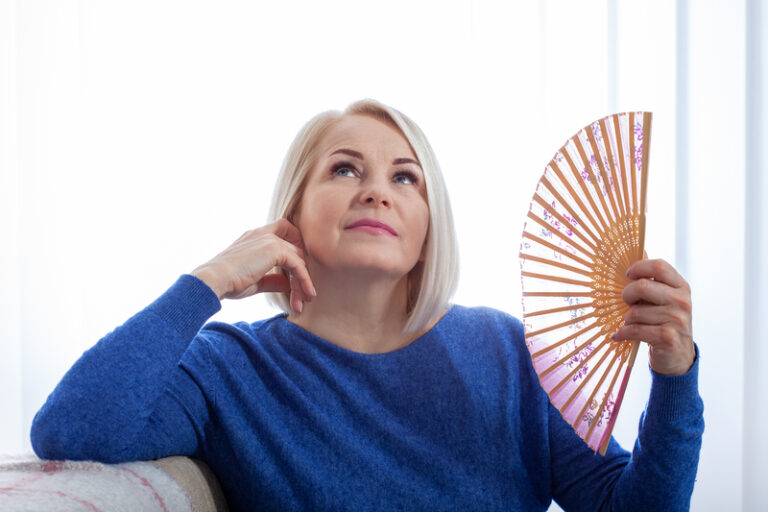Hot flashes during peri-menopause and menopause are seriously annoying! Fortunately, there are things that you can do to help them.
The body has a plethora of hormones that are always changing and adjusting to stresses in the interior and exterior environment. One of those stressors is regulating temperature. As you age, the hypothalamus becomes more sensitive to these changes, likely due to reduction of estrogen levels, which then causes events to occur to dissipate heat (hot flashes occur). For many, to say that these changes are uncomfortable, is an understatement. Neurotransmitters in the brain can also play a role as some of the other chemicals that also regulate temperature.
Then there are lifestyle factors. These factors either exacerbate existing hot flashes, trigger them, or set the stage for more intense hot flashes to occur. These include, diet (eating hot or spicy foods, consuming alcohol or caffeine), exercise (too much or too little can contribute to menopausal symptoms), stress (the more the stress the more the imbalance in the endocrine/hormonal system), and body weight (too skinny or too much body fat), and smoking. Changes in each of these areas can be helpful in reducing your symptoms.
Environmental factors include outdoor or indoor temperatures, clothing and bedding (tight or heavy fabrics hold too much heat in) and xeno-hormones. Xeno-hormones are also known as “hormone mimickers” or “endocrine disruptors”. They are synthetic and even natural chemical compounds that interfere with the body’s hormonal systems, causing imbalances that can result in menopausal symptoms. Bisphenol A (BPA) found in plastics, phthalates (plastics, personal care products, medical devices, etc.), Parabens (in cosmetics), polychlorinated Biphenyls (PCBs – industrial chemicals, paints, electrical equipment, etc.), Dioxins (in bleached papers, and industrial byproducts), certain pesticides, flame retardants, and heavy metals found in the soil and manufacturing are examples of xeno-hormones. The list is huge, so do some more research on what they are and how much they affect your endocrine/hormonal system, and how to limit them.
You can do all things “right” to prevent hot flashes and other menopausal symptoms, and still get them anyway – so what can you do?
Avoid the Xeno-hormones we discussed as much as you can. Avoid plastics, choose personal care products that don’t use chemicals, eat organic, avoid processed foods, filter your water, and use proper ventilation wherever required. Exercise moderately and consistently, quit smoking and drinking alcohol, wear light, breathable fabrics, reduce your stress whenever possible and moderate your weight. You can also do acupuncture.
Acupuncture helps hormonal symptoms by regulating hormones, improving the functions of the organs that generate or disseminate hormones, reducing the effects of stress on the body, reducing anxiety and depression, improving circulation, modulate the immune and autonomic nervous systems, improve sleep and in other ways.
You really don’t have to suffer the heat menopause brings. There are answers.
Want to hear more from Dr. Carling? Check out our podcast. Search for VitalHealth4You on your favorite podcast listening app or go to vitalhealthcda.com/podcasts/
©2024 Holly A. Carling, O.M.D., L.Ac., Ph.D.







